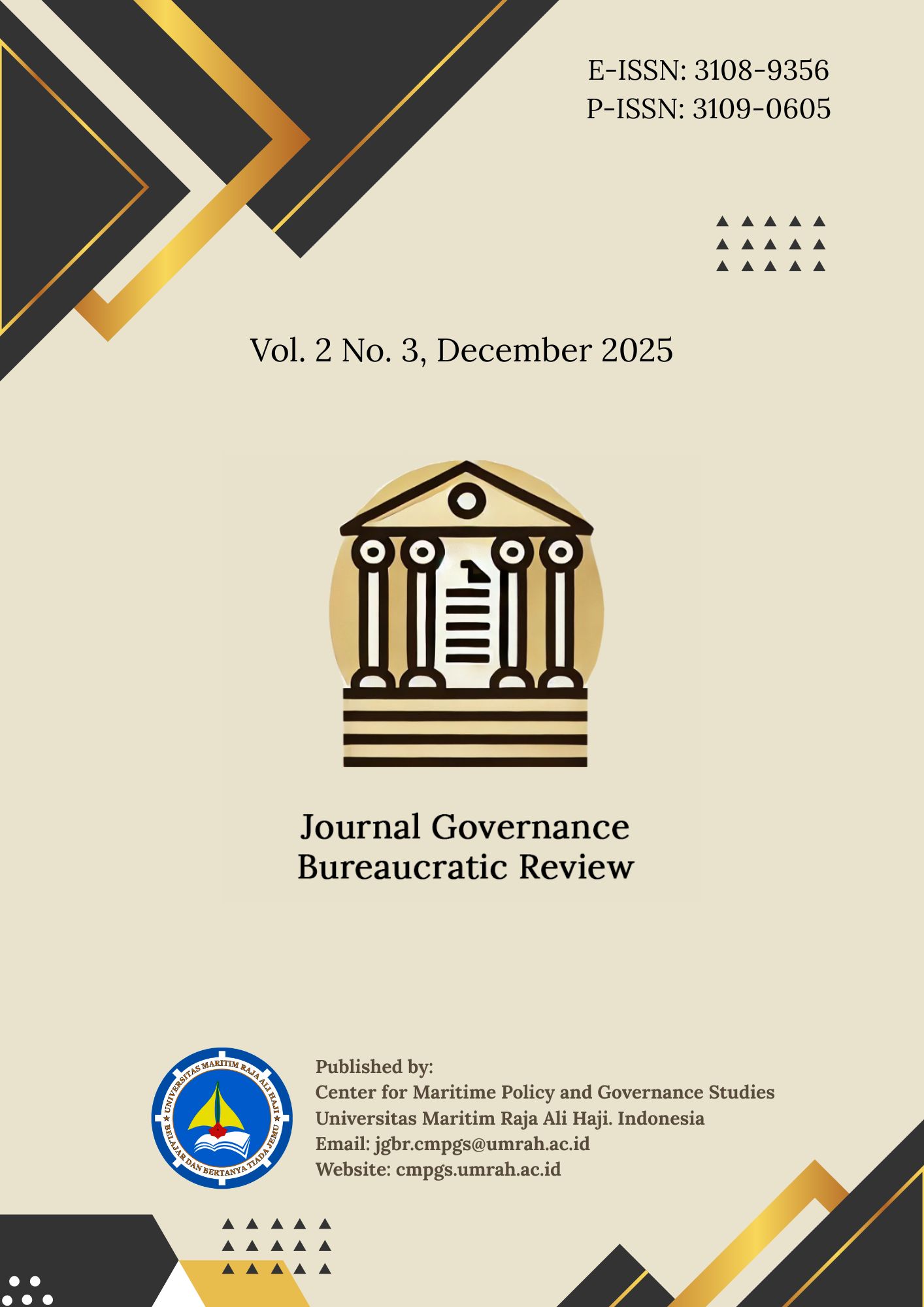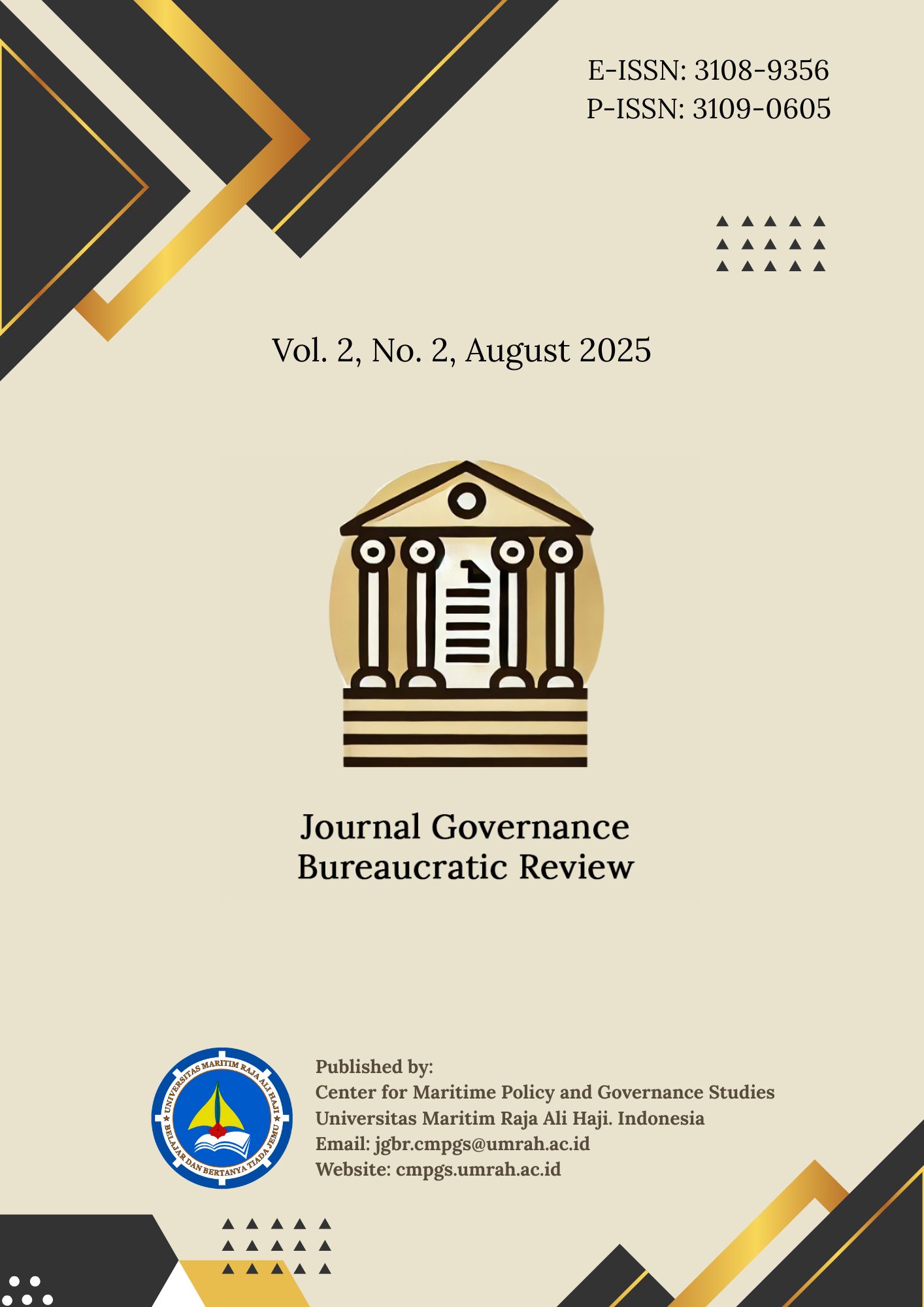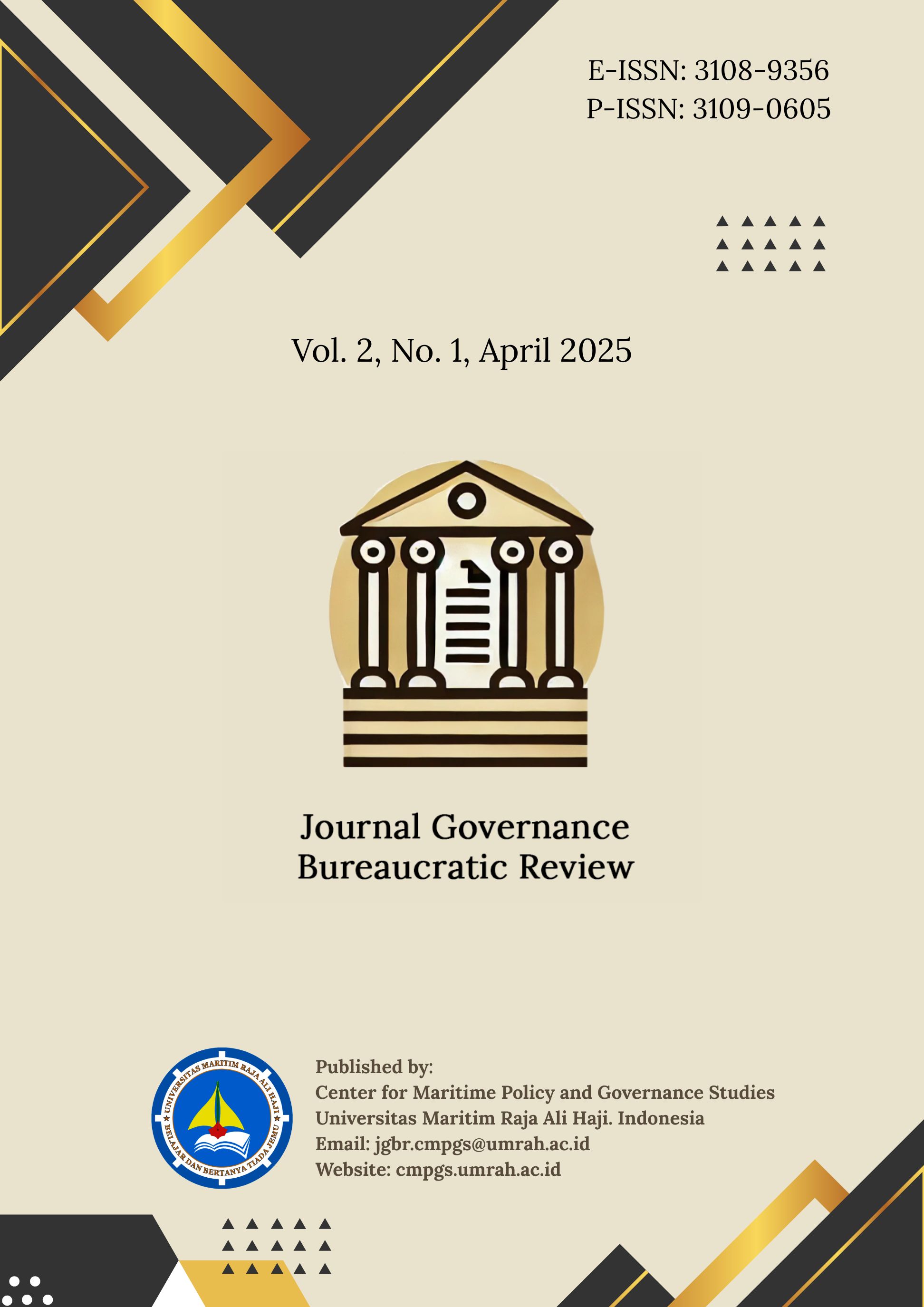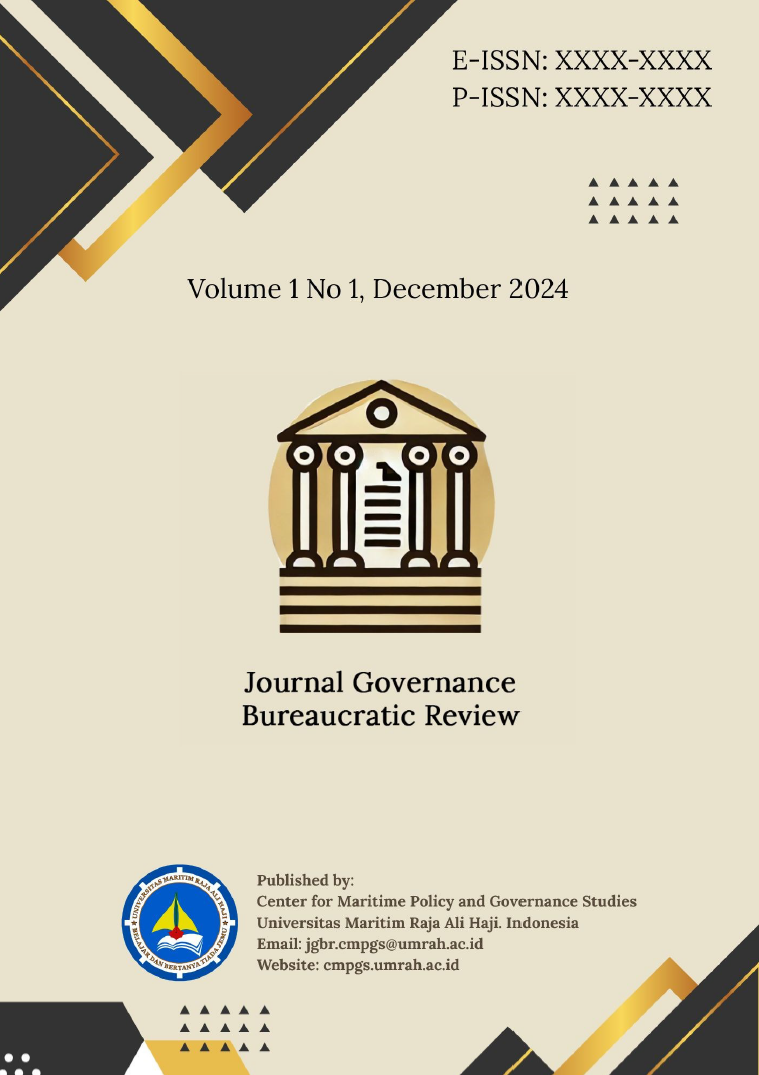COVER JOURNAL

TABLE OF CONTENT
TOOLS
CITATION ANALYSIS
ISSN BARCODE


VISITORS
IN COORPORATION WITH


KEYWORDS

The first article, Policy Direction for Strengthening Accountability and Transparency in the Management of Direct Grant Receipts at BMKG, by Syafridawati Syafridawati, highlights the need to strengthen accountability and transparency in managing direct grant receipts at BMKG. It emphasizes policy directions that can improve administrative compliance, clarify reporting mechanisms, and reinforce oversight so that grant management becomes more orderly and defensible. The second article, Strategic SWOT Analysis of Municipal Solid Waste Management and Waste Bank System in Bandung City; Toward a Circular and Sustainable Urban Future, by Rita Margaretha, examines municipal solid waste management and the waste bank system in Bandung using a SWOT framework. The study maps strengths, weaknesses, opportunities, and threats to formulate strategies toward a circular economy and a more sustainable urban future through stronger institutions, citizen participation, and improved governance of waste services. The third article, Optimizing Policies for the Distribution of Social Assistance (BANSOS) and Direct Cash Transfers (BLT) to Ensure Targeting Accuracy and Improve Economic Welfare, by Fiqi Restu Subekti and Noni Kensiwi, addresses persistent problems of targeting accuracy in social assistance and cash transfer programs. The fourth article, Data and Technology Based Bureaucratic Governance Innovations: A Model for Strengthening Institutional Quality in Public Sector Reform in Indonesia, by Muhammad Distian Andi Hermawan, proposes a model of bureaucratic governance innovation based on data and technology to strengthen institutional quality within Indonesia’s public sector reform agenda. It underscores process digitalization, evidence-based decision-making, and service modernization as foundations for improving performance, integrity, and institutional responsiveness. The final article, Transforming Governance to Implementation Foreign Loan-Funded Activities in BMKG for Good Governance, by Yusuf Fadhoni, reviews governance transformation in the implementation of BMKG activities funded by foreign loans. The study emphasizes strengthening good governance principles through more accountable planning, risk management, cross-unit coordination, and transparent implementation so that external financing produces effective and credible program outputs.
Enjoy Reading!!

Five Articles from Indonesia Explore Contemporary Policy Implementation and Governance Challenges. The latest issue features contributions from Indonesian scholars examining public policy dynamics through theoretical and empirical lenses. The first article, Policy Implementation in Resource-Scarce Political Environments: Applying Peter S. Cleaves’ Framework to Indonesia’s National Health Insurance (JKN), by Nada Aiyskamila Ramadani, Gloria Yemima Simanjuntak, Dewi Nopika Putri, Lulu Marisa Lumban Tobing, and Maya Yulika, investigates how limited resources influence the effectiveness of JKN. The study employs Cleaves’ policy implementation framework to assess institutional capacity, bureaucratic adaptation, and political constraints shaping Indonesia’s universal health coverage system. The second article, Implementation of the Job Creation Law: Severance Pay from the Perspective of Pressman and Wildavsky’s Theory, by Deva Garcia Katanging, Nabila Nabila, Siska Aulia Putri, Merry Viona, and Lina Sahida BR Sinaga, analyzes the challenges of translating legislative intent into practical labor policy. Grounded in Pressman and Wildavsky’s implementation theory, the paper explores bureaucratic coordination and the gap between legal mandates and worker protection outcomes. The third article, Implementation of the TPKS Law in DIY from the Perspective of Policy Network Theory, by Zahmil Husein, Rangga Rangga, Kevin Andika Putra, Muhammad Padillah, Muhammad Nabiel Azirah Djou, and Gea Ananda Putri Septiyanti, examines collaborative governance among institutions combating sexual violence. Through the lens of policy network theory, the authors highlight coordination mechanisms, stakeholder interdependence, and structural barriers to effective policy realization in Yogyakarta. The fourth article, Top-Down Implementation of the Job Creation Law: Reforming Environmental Impact Assessment Policy and Implications for Environmental Governance in Indonesia, by Sofi Ayyasi, Nur Syofi Shahirah, Ni Luh Viya Anggun Cahyani, Briean Sandika Arjuna, Agatha Cristy Siregar, and Inggrid Sisilia Lumban Raja, evaluates how central government reforms reshape environmental assessment frameworks. The study emphasizes the tension between regulatory efficiency and participatory environmental governance within Indonesia’s evolving policy architecture. The final article, Bounded Rationality in Energy Policy: Analyzing the Ban on Retail Sales of Subsidized 3-Kilogram LPG in Indonesia, by Sonia Trifosa Siahaan, Gege Laudie, Angel Icha Leony Siringo-ringo, Diva Nayla Salsabila, Bintang Aryanisah, and Fawwaz Ghufran, applies the concept of bounded rationality to evaluate decision-making in the state’s energy policy. It highlights cognitive and institutional limitations that shape subsidy reform and discusses the implications for equitable energy distribution.
Enjoy Reading!!

12 Author from Indonesia and Philippines to contribute. The latest issue features contributions from authors based in Indonesia. The first article, Ethics of Artificial Intelligence Usage in the Judiciary to Uphold Efficiency and Justice, by Tri Suhendra Arbani, explores the implications of integrating AI into judicial systems. It emphasizes the balance between efficiency gains and ethical challenges, highlighting the potential risks of bias, accountability concerns, and the importance of safeguarding justice while leveraging technological innovation. The second article, Direct Regional Head Elections and Excessive Corruption Loopholes, by Endro Tri Susdarwono and Surahmadi Surahmadi, investigates how direct elections for regional heads may unintentionally open avenues for corruption. The authors discuss systemic weaknesses in the electoral process, including financial pressures and political patronage, and suggest reforms to mitigate corrupt practices while maintaining democratic integrity. The third article, Bibliometric Study of Bureaucratic Culture, Leadership, and Educational Psychology in ASEAN (2010–2024), by Muhammad Hisyam Syafii, Rudyn Aladaya, and Nurlaela Hamidah, provides a bibliometric mapping of scholarly trends across ASEAN. The study identifies thematic patterns and research gaps in the intersections of bureaucratic culture, leadership, and educational psychology, offering insights into the evolution of academic discourse in the region. The fourth article, Analysis of Gas Station Queue System; Case Study Gas Station 13.201.101 on Jalan Jamin Ginting, Medan Baru District, Medan City, by Johana Purba, Roberta Simarmata, and Mayono Suko Marbinoto, examines operational efficiency at a local fuel station. Using queue system analysis, the research highlights bottlenecks and proposes strategies for improving service flow and customer satisfaction. The final article, Governance Community Empowerment Through the EMAK.ID Waste Bank Program in Bandar Lampung City, by Aditiya Irawansyah, Ani Agus Puspawati, and Ita Prihantika, investigates a community-based waste bank initiative as a model for empowerment and environmental governance. The study underlines the program’s role in fostering collective responsibility, economic benefits, and sustainable waste management practices at the local level.
Enjoy Reading!!

The first article, Optimizing Marine Governance in the Kepulauan Riau for Ecosystem Sustainability and Economic Welfare, by Hena Salsabila Putri, Fahriana Nur Anita, Nelinia Aulija, and Dinda Amalia, explores the enhancement of marine governance systems to achieve ecological balance and economic prosperity in the Riau Archipelago. It emphasizes the need for integrated policies, community involvement, and sustainable practices to maintain marine biodiversity while promoting the local economy. The second article, Bureaucratic Reform and Economic Growth: The Case of Bintan Regency's Development Strategy, by Ibaniyah Ibaniyah, Irma Metyana, Ranti Marshanda Sintiana, Sri Kesuma Dewi, and Syafiq Ramadan, examines the relationship between bureaucratic reform and economic growth in Bintan Regency. The study highlights the transformation of local governance structures and their impact on policy implementation efficiency and regional development outcomes. The third article, Stakeholder Analysis Waste Management in Tanjungpinang City, by Permata Pebester Natalia Hutahaean, Damayanti Simangunsong, Elisa Mardiyanti, Auliana Okta, and Indah Puji Lestari, investigates the roles and interests of various stakeholders in waste management initiatives in Tanjungpinang City. It outlines the importance of collaboration among local governments, communities, and private sectors in addressing urban waste challenges. The fourth article, PESTLE Analysis of the Free Nutritious Meal Program Policy in Indonesia, by Marnia Marnia, Lydia Agustini, Dedek Hardianti, Palentin Enjelika Turnip, Fridayanti Waruwu, and Agung Dewana Firda, utilizes the PESTLE framework to evaluate Indonesia's free nutritious meal program. The analysis considers political, economic, social, technological, legal, and environmental factors that influence policy effectiveness and its implications for public health and education. The final article, SWOT Analysis in Performance Accountability of the Yogyakarta City Human Resources Development and Personnel Agency, by Mahadiansar Mahadiansar, applies SWOT analysis to assess the strengths, weaknesses, opportunities, and threats in the performance accountability mechanisms of Yogyakarta's HR agency. The paper provides strategic insights into improving institutional transparency and human resource management in local governance.
Enjoy Reading!!
Journal Governance Bureaucratic Review This work is licensed under
a Creative Commons Attribution-ShareAlike 4.0 International License![]()
Published by:
Center for Maritime Policy and Governance Studies. Universitas Maritim Raja Ali Haji. Indonesia
Email: cmpgs@umrah.ac.id | Website: cmpgs.umrah.ac.id
